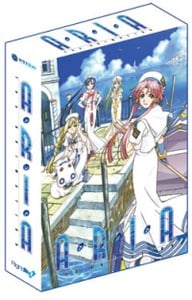Review
by Carl Kimlinger,Aria The Animation
Sub.DVD - Season 1
| Synopsis: |  |
||
Aqua is a planet of water. Ninety percent of its surface is water, and its citizens live simply, eschewing the mechanized excess of humanity's home planet. In the beautiful, watery city of Neo-Venezia—patterned after the extinct city of Venice—the waterways are ruled by gondola-rowing tour guides known as undines. Akari, an immigrant from Manhome, is an apprentice gondolier at the tiny but well-respected water guide company Aria. She works under Alicia, one of the top guides in the city, and along with fellow apprentices Alice and Aika, practices hard, explores fearlessly, and absorbs the simple wonders of her new home with the unfeigned enthusiasm of a child. |
|||
| Review: | |||
Aria is unquestionably the nicest anime Junichi Satō has made in his long and storied career as a director of nice anime. It's a nearly perfect pairing of source material and animator—the man behind relentlessly optimistic gems like Kaleido Star, and Kozue Amano's “futuristic healing comic” were made for each other—and the collaboration yields a pointedly reassuring series whose poetic sensibilities elevate it to something sublime. Each episode is a finely fashioned tone poem steeped in a love of the slow rhythms of everyday life and told with an elegant self-possession that places it light-years beyond the vulgar moralizing of most “uplifting” stories. The sweet simplicity of the characters complements that of the stories woven around them, the warmth of their interplay a mirror of that inspired by the series' quiet celebration of the magic of normalcy. And cradling it all is Neo-Venezia, alive with wind and water, its lived-in architecture and golden, benevolent mysteries creating a world of such gentle beauty that neither the impossibly nice cast, nor their embarrassingly uplifting adventures, feels the least bit out of place. It's a confluence of visual and storytelling art that is only possible in the hands of a master. Sato makes the wind and the water live, synchronizing their natural rhythms with that of each episode's plot and those of the delicate score (featuring the crystalline arias of the late, great Eri Kawai), creating a relaxing narrative flow that one can't help but be swept up in, to float effortlessly until the end credits roll. It's a fantasy of course—no where in the real world does as idyllic a city as Neo-Venezia or as indefatigably positive a person as Akari exist—but it's a gorgeous, seductive fantasy. In Sato's world of clean natural beauty and lazy Mediterranean living, even Akari's “sappy lines” (as Aika calls them) fall from her lips like wholly appropriate poetry (helped, of course, by a sweetly convincing performance from Erino Hazuki). It's also a fantasy that won't be to all tastes. Just as a series that is unrealistically grim will alienate some, so too will a series that is unrealistically optimistic. Even fans of the series might find it advisable to break the whimsy into manageable chunks. It's one of the few times when Right Stuf's often irksome habit of tacking English credits onto the end of every episode is actually an advantage, dividing each disc up as if it were a collection of short-form films on a single theme. As for the rest of Right Stuf's treatment of the series, it's pretty much what has become standard now that they've moved to box sets: thirteen episodes across four thinpak-ed discs in a solid box with a sizable booklet snugged in next to them. The booklet is laid out like a guidebook, and thus avoids feeling like an episode-by-episode recap, despite the fact that it is largely regurgitating (in disappointing monochrome) information presented in the series. The discs themselves are heavy with extra material, some of it disposable (trailers, promos, etc) but most of it excellent, including a series of lively if standardized interviews with the six lead actresses, and a six-part travelogue called “Satojun's 'Venice, I'm Sorry'”, in which Junichi Satō narrates his research trip to Venice. Sato's travelogue is notable not only for the insight it gives into his methodology and the making of the series (check out the side-by-side comparisons in the final episode), but also for the unusual charm he displays (to see just how unusual, compare this to just about any interview with Mamoru Oshii). Slow, deliberate, and anti-dramatic, Aria isn't a traditionally entertaining series. It dabbles in humor and pathos, but more than anything it is a soft but magnetic invitation to submerge oneself in a world where kindness reigns supreme and life is overflowing with subtle beauty. And unlike many of its brethren, it's all too easy to surrender to the call and to emerge each episode refreshed and, ultimately, entranced. |
|
The views and opinions expressed in this article are solely those of the author(s) and do not necessarily represent the views of Anime News Network, its employees, owners, or sponsors.
|
| Grade: | |||
|
Overall (sub) : A
Story : B
Animation : A
Art : A
Music : A
+ A gorgeous future fantasy populated with loveable characters. |
|||
| discuss this in the forum (28 posts) | | |||
| Production Info: | ||
|
Full encyclopedia details about Release information about |
||